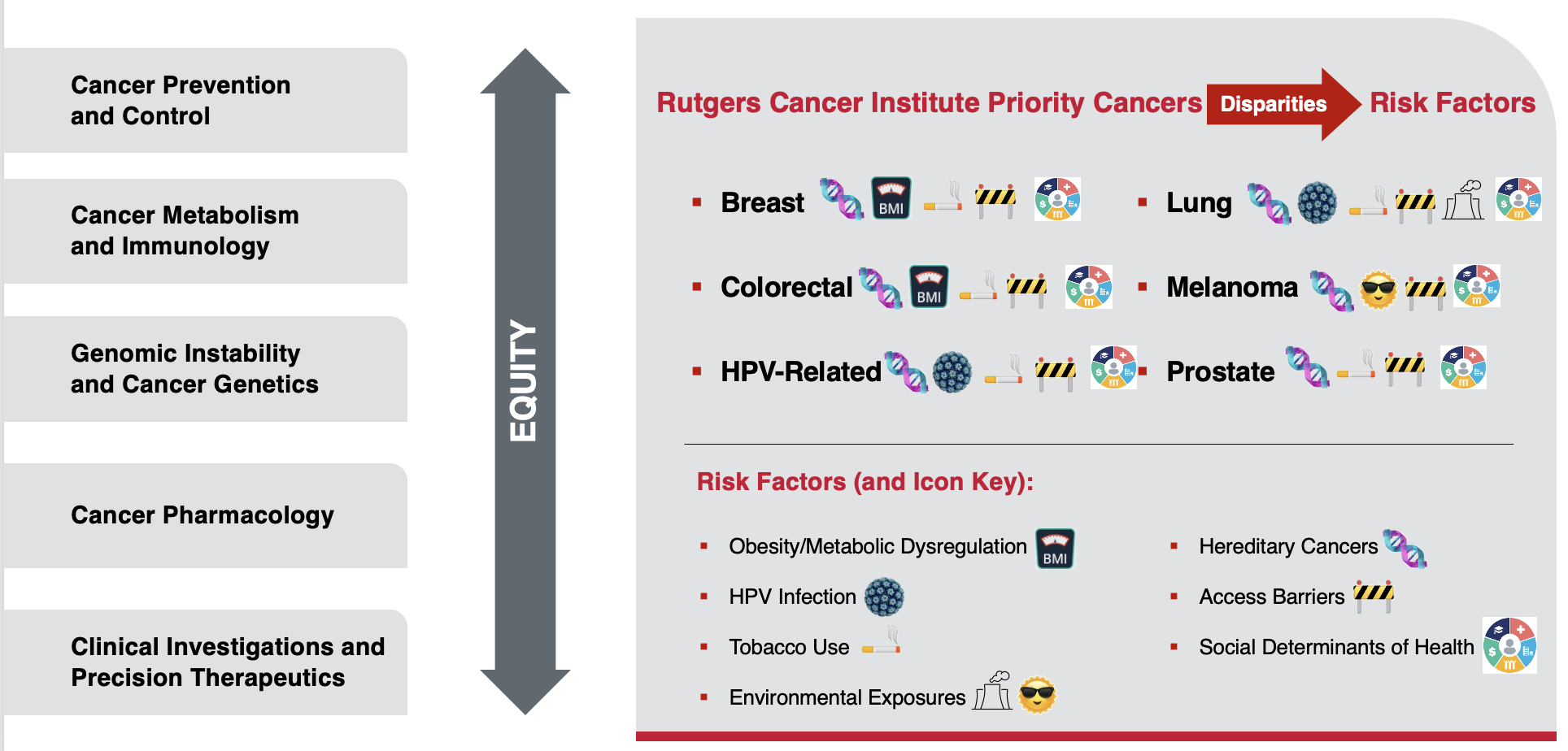Research Programs
Rutgers Cancer Institute of New Jersey prevails, as the State of New Jersey's only National Cancer Institute (NCI)-designated Comprehensive Cancer Center, to satisfy the cancer research demands of one of the most diverse and densely populated states in the nation. As a matrix and consortium cancer center that has been continuously funded by the NCI Cancer Center Support Grant (CCSG P30CA072720) mechanism since 1997, Rutgers Cancer Institute conducts state-of-the-art research, patient care, and outreach/education.
Rutgers Cancer Institute attracts investigators from a wide range of scientific disciplines to focus on cancer research.
Based on research strengths and direction, members are organized into five programs comprised of faculty who form cohesive, interdisciplinary groups supported by peer-reviewed grants and Rutgers Cancer Institute shared resources. Programs are organized into three divisions: Basic Science Research, Clinical Research, and Population Research.
Research Programs:
- Cancer Metabolism and Immunology (CMI)
Program Leaders: Wei-Xing Zong, PhD and Christian Hinrichs, MD
- Genomic Instability and Cancer Genetics (GICG)
Program Leaders: Zhiyuan Shen, MD, PhD, Chang S. Chan, PhD, and Cristina Montagna, PhD
- Cancer Pharmacology (CP)
Program Leaders: X. F. Steven Zheng, PhD and Stephen K. Burley, MD, DPhil - Clinical Investigations and Precision Therapeutics (CIPT)
Program Leaders: Shridar Ganesan, MD, PhD and Wadih Arap, MD, PhD
- Cancer Prevention and Control (CPC)
Program Leaders: Carolyn J. Heckman, PhD and Elisa V. Bandera, MD, PhD
Rutgers Cancer Institute has a unique niche among NCI-designated centers, as it benefits from opportunities as a matrix cancer center and at the same time has statewide authority beyond the university matrix, thus establishing an environment to foster and formalize a vision of transdisciplinary and translational research.
CALENDAR: Program Meetings, Lectures and Other Events for Researchers
Research Addressing Statewide Cancer Burden and Disparities
Criteria that Guide Rutgers Cancer Institute's Prioritization of Cancer Control Activities and Research
1. Accessible and adequate data on risk factors and the cancer burden
2. Significance of the risk factor/cancer burden in New Jersey
3. Alignment with the NJ Cancer Control Plan and other state/regional priorities
4. Strengths of Rutgers Cancer Institute research
5. Availability of evidence-based and effective strategies for prevention and screening
6. Feasibility of implementing evidence-based interventions
7. Potential for appreciable impact
Determined by Community Cancer Action Board, Rutgers Cancer Institute Leadership, NJ Cancer Control Plan, Department of Health
Using established prioritization criteria, a data driven approach, and community engagement, Rutgers Cancer Institute has identified six priority cancer areas in which to focus cancer center research and outreach efforts – also known as our “catchment area priorities”. These priority cancers are: breast, colorectal, HPV-related cancers (including cervical, oral and anal), lung, prostate and melanoma. All six of these cancer types have a high burden in New Jersey, have notable disparities, or are related to key risk factors that are priority targets for cancer prevention and control initiatives. To address key risk factors, we also support research and cancer control efforts in: environmental exposures, hereditary risk, HPV infection, obesity/metabolic dysregulation and tobacco use.
Rutgers Cancer Institute's catchment area priorities are reviewed annually by leadership, our Community Cancer Action Board and other key stakeholders. The annual reviews are guided by catchment area surveillance and assessments, and are informed by ongoing bidirectional dialogue with New Jersey communities through mechanisms such as outreach events, Community Science Cafés and thorough analysis of catchment area data.


